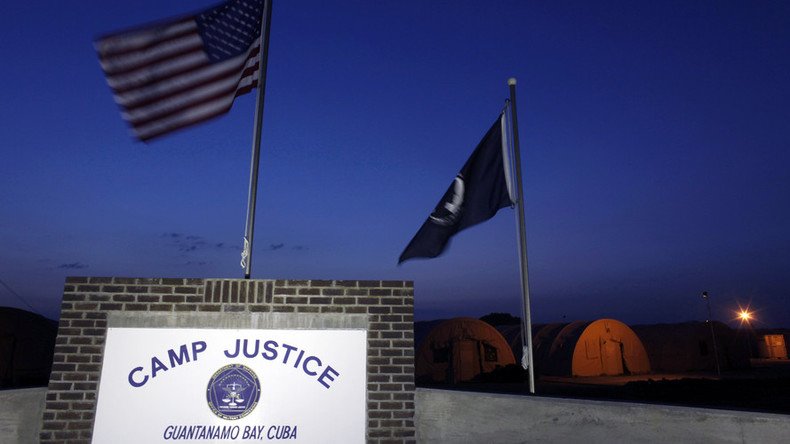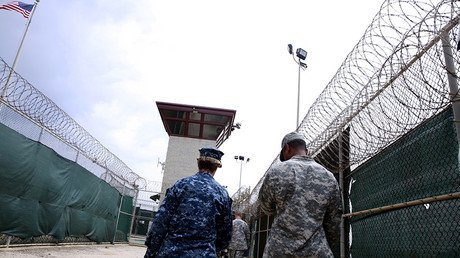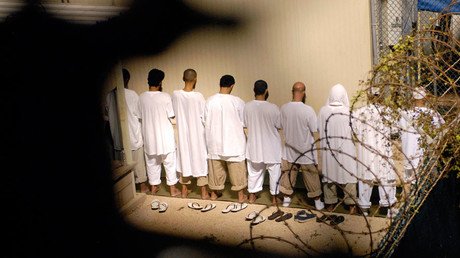US guilty of ‘gross miscarriages of justice’ in order to justify Guantanamo – study

A study by Afghan-based research group came to troubling conclusions regarding the US government’s handling of Guantanamo Bay, finding it used bad intelligence and rigged its own legal system to justify detentions, thus prolonging the Afghan war.
The author of the study by the Afghan Analysts Network says systemic ignorance of reality by both intelligence and military, as well as attempts to justify the War on Terror by any means necessary, have created a mechanism that only prolonged the conflict – America’s longest in history – and strengthened the Taliban insurgency.
Author Kate Clark delves deep into the case of eight remaining Afghans at Guantanamo. Their varying stories are used as case studies for how badly things can go wrong if bad intelligence is being upheld by a rigged justice system.
The eight are the longest-serving inmates, all of whom are either still at Guantanamo, or have been transferred to UAE facilities. Of the eight, six were captured in the early days of groundless arbitrary detentions. The report, based on a wealth of documents and testimony, found that the “in none of the eight cases” has the US military “been able to substantiate its accusations.” Moreover, the special boards set up to ensure only enemy combatants were detained, failed in the basic task of clearing out “obvious, multiple mistakes” from detainee files – something that all but ensured wrongful detention.
And finally, it was found that the faltering justice mechanism was unwilling to stand up to the executive: “they have failed to question what the government has asserted or protect individuals from the arbitrary power of the state,” Clark writes.
“Reading through the United States military and court documents outlining the allegations and evidence against these eight men, one enters a Kafkaesque world of strange, vague accusations, rife with hearsay, secret evidence, bad translations, gross errors of fact and testimony obtained under duress and torture,” she recounts.
The mistakes take root at the start of the conflict, when the US had used local allies to round up possible terrorists. It is anyone’s guess what methodology they had used. Quite often, an innocent would be snatched off the streets because his accuser was settling an old score, according to the study.
“Almost anyone could be detained,” Clark writes. To make the evidence stick, incredulous allegations were thrown around, such as the detainee being part of one or multiple groups with connections to so and so. Clark shows “how Afghan allies of US forces were able to exploit their lack of information about the country to denounce their personal or factional enemies and get them detained.”
Before long, entire tribal villages would be stripped of men and popular anger was ignited and transformed into something else. But the US needed to justify the detentions, so was happy to go along with them.
It wasn’t until 2004, when the Supreme Court had given Guantanamo detainees the right to contest their detention that the US suddenly had to justify why they were imprisoned. In effect, a lot of the cases against them were made “retroactively”, Clark writes, as the Americans fished for connections to try and prove they were doing useful things and were within their right to arrest the Afghans.
“Meaningless strings of associations – detainee knew X who knew Y who knew Z who knew bin Laden –[were] put forward as evidence of wrongdoing,” she says.
Back home, this approach was fueled by the need to catch the leader of Al Qaeda, and to justify the war. So the US justice system was shown to be ineffective against flimsy evidence used to keep 220 Afghans at Guantanamo. At one point, they comprised nearly a third of the prison’s 781-man population.
“The vague nature of the allegations has been aggravated by murky and changing laws, shifting interpretations of the law and the Byzantine way US governments, courts and military review boards have dealt with the detainees,” Clark explains. “The military boards established by the state, purportedly to ensure the US was only holding actual combatants and only those who were dangerous to the US or its allies, utterly failed to question the claims made to them.”
The resulting “factual errors” and “case filed rife with contradictions” were commonplace. Not to mention charges that included offenses never even described by law. Military trials and habeas corpus petitions were all held up by procedure; new evidence was introduced without proper process, with a lot of it simply being kept from the defendants and public alike – in some cases from those who had clearance. On top of that, hearsay and statements made under duress or torture had been commonplace evidence at the hearings.
The judges “did not know which system of law they had to apply,” because this process did not resemble anything they’d had to deal with previously.
“Viewing the US detention regime through the lens of the Afghan experience in Guantánamo raises broader questions about the effectiveness of US intelligence and justice. This study’s ‘deep dive’ into the Afghan files by a country expert has revealed multiple, obvious and persistent flaws in the intelligence which left men detained for more than a decade. Is this the case for the intelligence behind the detention of other nationalities also?”, Clark asks. In her view, the power to arbitrarily detain has only resulted in “gross miscarriages of justice” against the victims and their families.














